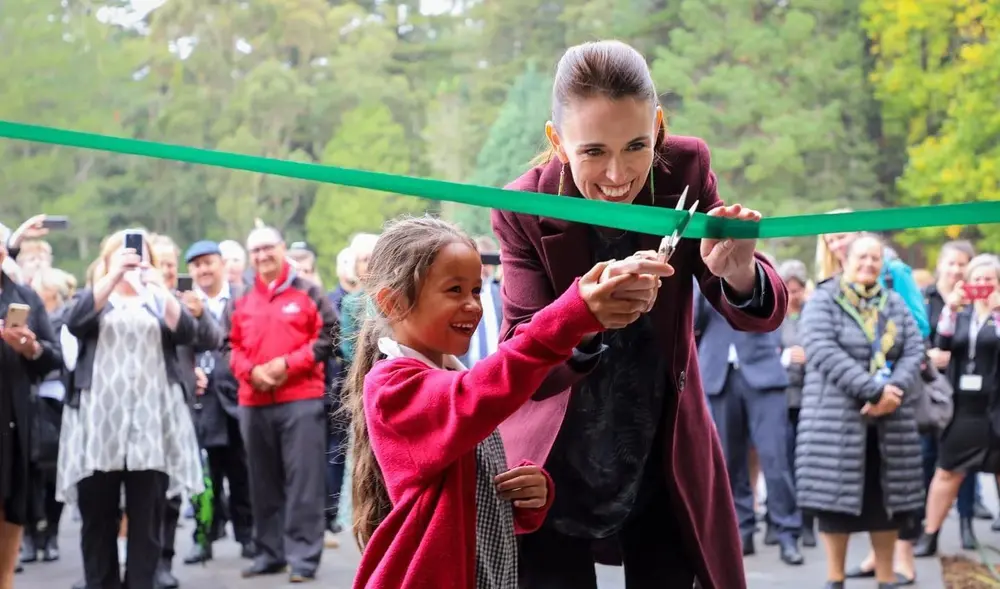“I no longer have enough in the tank"

In a surprise move, Jacinda Ardern announced her resignation as New Zealand’s Prime Minister (PM) citing personal reasons and a desire to spend more time with her family. Elected in 2017, Ardern led the Labour Party to a historic victory whilst becoming New Zealand's youngest female PM at 37 years of age. Ardern quickly made a name for herself on the world stage as a leader who prioritized the well-being of her citizens and put forward progressive policies to address some of New Zealand's most pressing issues, which now become her important legacies.
Who is Jacinda Ardern?
Jacinda Ardern was born on July 26,1980, in Hamilton, New Zealand. Ardern earned a bachelor’s degree in communication studies in 2001 at the University of Waikato where her association with the Labour Party had already begun. She landed a position as a member of staff for Prime Minister Helen Clark, Ardern’s political hero and mentor. Ardern served in the cabinet office of British Prime Minister, Tony Blair.
At age 28, Ardern entered the House of Representatives as its youngest member. Ardern has served as the 40th prime minister of New Zealand since 2017 and served as the leader of the Labour Party from 2017 to 2023 (Wallenfeldt, 2023). What inspired Ardern to enter politics was when she saw “children without shoes on their feet or anything to eat for lunch” at Murupara, a small decayed logging town with a relatively high crime rate. Ardern’s youthful charisma, feminist progressive values and compassionate leadership style shot her to fame (Zhuang, 2023).
She has described the extent of child poverty and homelessness in New Zealand as ‘a blatant failure’ of capitalism. In global politics, Jacinda Ardern has been very popular over the years with the ‘jacindamania’ syndrome as described in The New York Times. A terrorist attack, a deadly volcanic eruption and the coronavirus pandemic are crises which Ms. Ardern manoeuvered through gaining global fame (Cortellazzo & Bruni, 2021). Hence, (McKee, 2021) describes Jacinda Ardern as someone who knows what they are doing and clearly views what needs to be done.
Ardern´s major policy Implementations and limitations
One of the key aspects of Ardern's legacy is her focus on child poverty and inequality. In her first year in office, she introduced a number of policies, for example, her government introduced a "Wellbeing Budget" aimed at reducing child poverty, including increasing welfare payments, introducing free doctor visits for children under 14 and raising the minimum wage. These policies have had an impact on reducing child poverty in New Zealand, although the numbers remain to be among the highest in developed countries.
Another important aspect is her response to the COVID-19 pandemic. New Zealand was one of the first countries to successfully respond and combat the virus, and Ardern's leadership was widely credited with the country's success. She implemented strict lockdown measures, closed the borders and made testing widely available. This helped to prevent the spread of the virus and allowed the country to return to normalcy more quickly than many other countries.
Ardern has also made a significant impact in the area of climate change. In 2019, she announced a target to make New Zealand carbon neutral by 2050, and she has since introduced several policies to help achieve this goal. This includes investing in renewable energy, planting trees and reducing emissions from transport. Although the government was criticised for making too much concession, her effort was recognised as making a crucial step by some, while others consider her to leave a more mixed record in this area.
Finally, Ardern's leadership style has been widely admired for its compassion and empathy. She has been credited with creating a more inclusive and caring society and has been a strong advocate for marginalized groups. This included her support for the LGBTQ+ community, her efforts to improve the lives of people with disabilities, and policies like childcare subsidies to promote gender equality.
Despite her successes, Ardern has also faced limitations and challenges in her role as prime minister. For example, her government has been criticized for its handling of the housing crisis, with many New Zealanders struggling to afford to buy or rent a home. Her fame is not actually the same in her country New Zealand as a result of her failure to deliver some of her campaign promises. And so following her shocking resignation, the media and other personalities have commented on some problems she will leave for her successor; the cost of living crisis, unaffordable housing, increasing crime and public discontentment over harsh Covid-19 measures.
After Ardern, what´s next?
Although Ardern was quoted saying, “I am not leaving because it was hard. Had that been the case, I probably would have departed two months into the job. I am leaving because with such a privileged role, comes responsibility, the responsibility to know when you are the right person to lead, and also when you are not. I know what this job takes, and I know that I no longer have enough in the tank to do it justice. It is that simple”. Her opponents point to the abundance of new problems and what they see as inadequate solutions for the old ones. What lies ahead for New Zealand's next Prime Minister is uncertain.
Ardern's international popularity sets a high standard for future leaders to follow. However, the challenges and limitations faced by her government also highlight the ongoing issues that will need to be addressed by the next Prime Minister. It is also without doubt that her leadership style and the way she handled her resignation serve as valuable lessons for leaders all over the world.
Overall, Prime Minister Jacinda Ardern has built a legacy of progressive leadership and compassionate governance. The ways she approached governance have been marked by her efforts to decrease child poverty, inequality, the impacts of climate change, promote immigrant integration, and prioritise refugee issues. New Zealand will remember Jacinda Ardern as one of its most popular and trusted leaders. There is a lot from her legacy that other world leaders should learn from.
Cover photo courtesy of Jacinda Ardern official Facebook Page
Further reading
Cortellazzo, L. & Bruni, E. (2021). Two sides of the same coin? An analysis of the authentic and charismatic leadership during crisis. Academy of Management Annual Meeting Proceedings (1):14818
Kwai, I. (2017). New Zealand election had been predictable. Then jacindamania hit. The New York Times. Available at https://www.nytimes.com/2017/09/04/world/asia/jacinda-ardern-new-zealand.html
Malpass, L. (2023). “Live: Jacinda Ardern announces she will resign as prime minister by February 7th”. Retrieved on 21 January 2023
McKee, M. (2021). Never again. Health and sustainable development in the light of the pandemic. What went wrong? Journal of Health Inequalities, 7 (2): 116-119
Rashbrooke, M. (2020). The seven key challenges facing Jacinda Ardern. Opinion. Available at https://thespinoff.co.nz/opinion/19-10-2020/the-seven-key-challenges-facing-jacinda-arden
Wallenfeldt, J. (2023). Jacinda Ardern: Prime minister of New Zealand. Encyclopedia Britannica
Zhuang,Y. (2023). Key moments in Jacinda Ardern’s political career. The New York Times. Available at https://www.nytimes.com/2023/01/19/world/australia/ardern-new-zealand- pm-moments.html
Roston, E. & Withers, T. (2023) Jacinda Ardern Leaves a Mixed Record on Tackling Climate Change. Available at https://www.bloomberg.com/news/articles/2023-01-24/jacinda-ardern-leaves-a-mixed-record-on-tackling-climate-change
Badham, V. (2023) Jacinda Ardern’s graceful departure is the personification of modern democratic ideals. Available at https://www.theguardian.com/commentisfree/2023/jan/19/jacinda-ardern-new-zealand-pm-resignation-modern-democratic-ideals
https://library.fes.de/pdf-files/id/ipa/17207.pdf
https://www.grin.com/document/1040139
https://www.vox.com/world/2023/1/21/23562489/jacinda-ardern-new-zealand-prime-minister-resign

Stephen Tete Mantey is an alumnus of the Willy Brandt School of Public Policy, and holds a Master of Science in Business Administration from Kwame Nkrumah University of Science and Technology, Ghana. His interests include Human Migration, Social and Health Policies. He worked in several roles as an administrator, project coordinator, and operations officer in recent years. He was the driving force behind the establishment of Legacy Hospital Ghana Limited. He volunteers in his free time to support founders of MSMEs in areas of business development and operational excellence.

Andrew Kisekka is an alumnus of the Willy Brandt School of Public Policy, as well as a Bachelor of Arts in Social and Philosophical Studies from Makerere University Kampala. In the past decade, Andrew has worked in various roles with several Financial Institutions in Uganda, focusing on client relationship management, business development, product development, and research. Additionally, he volunteers at a community development organization where he reviews grant requests, conducts research, and evaluates programs.
~ The views represented in this blog post do not necessarily represent those of the Brandt School. ~